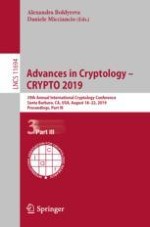2019 | OriginalPaper | Buchkapitel
New Constructions of Reusable Designated-Verifier NIZKs
verfasst von : Alex Lombardi, Willy Quach, Ron D. Rothblum, Daniel Wichs, David J. Wu
Erschienen in: Advances in Cryptology – CRYPTO 2019
Aktivieren Sie unsere intelligente Suche, um passende Fachinhalte oder Patente zu finden.
Wählen Sie Textabschnitte aus um mit Künstlicher Intelligenz passenden Patente zu finden. powered by
Markieren Sie Textabschnitte, um KI-gestützt weitere passende Inhalte zu finden. powered by
